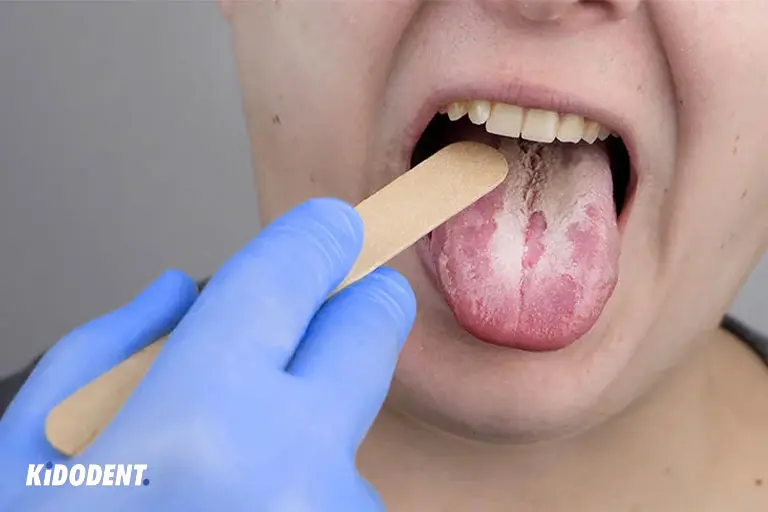What is oral thrush?
Mouth thrush or oral candidiasis is a type of fungal mouth infection and is the most common fungal disease in the mouth. Thrush is white plaques or patches of white coating that grow in the back of your mouth on your oral mucosa, on the tongue, inner cheeks, and also on the oropharynx part of the mouth.
Thrush can develop in your mouth because of changes in the organism called candida albicans that are part of your normal oral flora (flora means microorganisms that exist in your mouth). When your oral and dental health is affected by systemic diseases, immune deficiencies or chronic antibiotics use, then thrush overgrows and shows itself in your mouth on oral mucosa and the skin inside your mouth.
There are more causes and we will talk about them. Plus, we will cover treatments, home remedies, and preventions to get rid of thrush in your mouth.
Although anybody can be affected by this oral fungal infection, young infants and the elderly are the most affected groups of people by the mouth thrush. Other names for mouth thrush include denture sore mouth (denture stomatitis), yeast infection, antibiotic stomatitis, and angular cheilitis.
What causes oral thrush?
The overgrowth of the candida albicans, which causes the fungal yeast infection, is what causes thrush. There are many causes for your oral thrush from medications like constant antibiotic use to systemic diseases and weak immune system of the body. Low saliva in your mouth increases the risks of infections and oral thrush is the most common one. The following factors are major causes of oral thrush:
- Systemic use of antibiotics
- Medications like corticosteroids
- Malnutrition
- Cancer chemotherapy and other radiation therapies
- Dry mouth
- Systematic diseases like diabetes mellitus, hypoparathyroidism
- Immune system deficiencies (disease like AIDS)
- Inappropriate denture size
- Lip-licking habit
- Pregnancy
- Infants immunologic defects
- Smoking
What are the symptoms of oral thrush?
White patches or coatings (white tongue) are the main characteristics of thrush. These patches if wiped off or scraped can turn into red lesions and ulcers and cause you pain and bleeding. Thrush can have several signs and symptoms depending on the type and severity. The symptoms of oral thrush are:
- White patches or plaques inside your mouth on inner cheeks and mucosa, on your throat and your tongue and palate
- Redness of mucosa (soreness)
- Pain
- Red mouth ulcers or lesions
- Difficulty in your speaking
- Bad breath and changes in your taste
- Burning and tenderness feeling in the mouth in severe cases
What are the treatments for oral thrush?
You have several topical choices to get rid of thrush infection in your mouth. You can use creams, mouthwashes, and tablets. Mouthwashes may have less contact with your mouth, but daily usage and selecting an antibacterial or antifungal mouthwash offer a great advantage to treat the infection.
Creams and tablets provide longer contact to your mouth and are highly effective topical treatments for oral thrush. Denture wearers can benefit from creams because they can easily apply the cream to the surface between their dentures or brides and their mouth. Also, tablets dissolve slowly and are the most useful topical medication that can expose the thrush in your mouth to antifungal agents for a longer time.
Topical medications: nystatin and clotrimazole are two common topical drugs for treating oral thrush. Your doctor or dentist plans a 2-week treatment time. During these two weeks, you should apply these medications 4 or even 5 times daily.
Medical treatments for severe forms
When oral thrush is caused by systematic diseases or immune deficiencies in your body, your dentist may prescribe some strong drugs as treatment. Two common systemic antifungal medications are ketoconazole and fluconazole, which can be prescribed by your dentist. These two medications can have serious side effects and dentists are careful about when and how to prescribe them.
What is the best mouthwash for oral thrush?
Using chlorhexidine mouthwash is the best way to get rid of the yeast infection in your mouth. Chlorhexidine mouthwash has antibacterial and antifungal properties, making it a great bacterial and fungal killer for treating your mouth thrush.
Does oral thrush go away easily?
Usually, oral candidiasis disappears after 2 weeks or even 1 week after the treatment, but in chronic cases, you will need a long-term therapy to overcome this fungal mouth infection. Thrush in infants in the first year of life happens frequently and if it doesn’t go away, you need to visit a pediatrician for its management in your baby’s mouth.
Home remedies for oral thrush
- Rinse your mouth with warm saltwater and baking soda to reduce the effects of oral infectious fungus
- Hydrogen peroxide rinse, and lemon juice rinse are good home remedies
- Apple cider vinegar with water is also known to have antifungal properties
- Daily oral hygiene of brushing and flossing
How to prevent thrush in your mouth?
- If you have a systemic disease, you need to be much more careful about your oral health and have a scheduled and regular using of the medications for your disease
- Try to have regular dental visits. If you see your dentist regularly, careful oral examinations and hygiene tips by the dentist can prevent oral infections and development of fungus
- Do not overuse mouthwash and mouth sprays especially those contain alcohol because they contribute to dry mouth and low saliva rate, which increase the risks for thrush growth
- Try to use less antibiotics and if you want to take any medications consult your primary care provider, physician or your dentist
- If you are wearing removable orthodontic appliance like aligners, bridges and dentures, disinfect these devices before putting into the mouth and always keep them in a clean place
